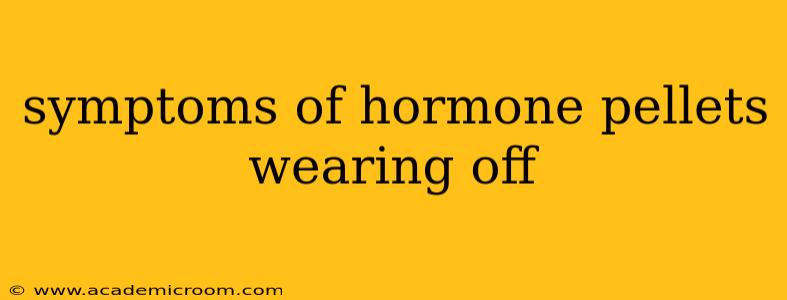Hormone pellet therapy, a popular method for hormone replacement therapy (HRT), offers a convenient way to manage hormonal imbalances. However, the effects of these pellets are not indefinite. Understanding the signs that your hormone pellets are wearing off is crucial for maintaining hormonal balance and overall well-being. This comprehensive guide will explore the common symptoms, address frequently asked questions, and provide insights into managing this transition.
What are Hormone Pellets?
Before diving into the symptoms of waning pellet effectiveness, let's briefly revisit what hormone pellets are. These small pellets, typically made of bioidentical hormones like estradiol or testosterone, are surgically implanted under the skin. They slowly release hormones into the bloodstream over several months, providing a consistent hormonal level.
Common Symptoms of Hormone Pellets Wearing Off
The symptoms of hormone pellets wearing off can vary depending on the individual, the type of hormone(s) used, and the initial hormone levels. However, some common indicators include:
-
Return of Pre-Treatment Symptoms: This is often the most telling sign. If you were experiencing symptoms like hot flashes, night sweats, low libido, fatigue, or mood swings before starting pellet therapy, a resurgence of these symptoms suggests the pellets are losing their effectiveness. The intensity and specific symptoms may vary.
-
Increased Fatigue: A noticeable increase in fatigue, even after adequate rest, can signal declining hormone levels. This is because hormones play a crucial role in energy production and regulation.
-
Mood Swings and Irritability: Hormonal fluctuations can significantly impact mood. Increased irritability, anxiety, or depression could indicate that your hormone levels are dropping.
-
Changes in Sleep Patterns: Insomnia, disrupted sleep, or difficulty staying asleep can be a symptom of hormonal imbalance. This is often linked to the return of night sweats or hot flashes.
-
Weight Changes: Unexpected weight gain or loss can be another sign. Hormones play a role in metabolism and appetite regulation, so changes in hormone levels can impact weight.
-
Decreased Libido: A noticeable decrease in sexual desire can be a symptom of declining hormone levels, especially for both estrogen and testosterone pellets.
-
Cognitive Changes: Some individuals report experiencing brain fog, difficulty concentrating, or memory problems as their hormone pellets wear off.
How Long Do Hormone Pellets Last?
H2: How long do hormone pellets last?
The duration of hormone pellet effectiveness varies considerably depending on individual metabolism, pellet size, and the type of hormone. Generally, the effects can last anywhere from three to six months, but some individuals may experience shorter or longer durations. Regular monitoring and blood tests are essential to determine the optimal replacement schedule.
What Happens When Hormone Pellets Wear Off?
H2: What happens when hormone pellets wear off?
As the pellets dissolve and release less hormone, your body will gradually return to its pre-treatment hormonal state. This means the symptoms you initially sought treatment for may reappear. The speed of this transition varies between individuals.
How Are Hormone Pellets Monitored?
H2: How are hormone pellets monitored?
Regular blood tests are crucial for monitoring hormone levels and determining when it's time for a new pellet implantation. Your doctor will schedule these tests based on your individual needs and response to therapy.
When Should I Contact My Doctor?
H2: When should I contact my doctor?
If you experience any of the symptoms mentioned above, or if you have concerns about your hormone pellet therapy, it's essential to contact your doctor promptly. They can perform blood tests to assess your hormone levels and determine the appropriate course of action. Don't hesitate to reach out – proactive management is key to maintaining optimal hormone balance.
Disclaimer:
This information is intended for general knowledge and informational purposes only, and does not constitute medical advice. It is essential to consult with a qualified healthcare professional for any health concerns or before making any decisions related to your health or treatment. They can provide personalized guidance based on your individual medical history and needs.
